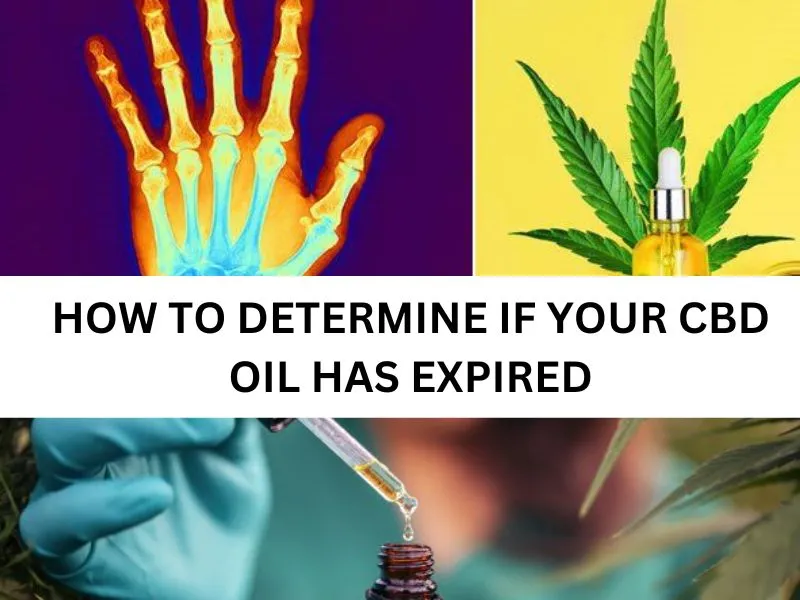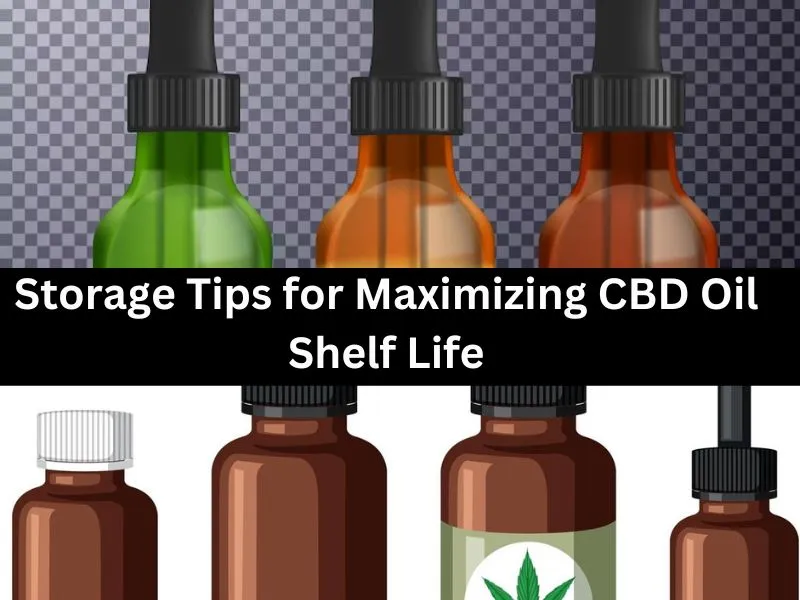CBD oil, derived from the cannabis plant, has gained popularity. Recently, CBD oil, extracted from the cannabis plant, has become increasingly popular due to its potential therapeutic advantages. However, CBD oil has a limited shelf life, similar to other consumable products. Using it past its expiration date raises concerns regarding its safety and effectiveness. This article explores whether expired CBD oil can pose any risks to your health and provide a comprehensive understanding of the potential effects.
Does CBD Oil Expire?
In short, Yes, CBD oil does expire. Over time, CBD oil undergoes changes that can affect its quality, potency, and effectiveness. While CBD oil has no definitive expiration date, it is generally recommended to use it within a specific timeframe to ensure optimal results.
The average shelf life of most CBD products ranges from approximately 14 to 24 months. However, it’s important to note that the potency of CBD may start to diminish after one year, particularly if proper storage guidelines still need to be followed. By taking a few simple precautions and ensuring the right environment for your CBD oil, you can help extend its shelf life.
Factors Affecting CBD Oil Quality Over Time
Several factors can influence the quality of CBD oil as it ages:
Degradation of Cannabinoids
Cannabinoids, including CBD and THC, can degrade over time due to exposure to oxygen, heat, and light. This degradation can result in a decrease in potency, potentially impacting the desired effects.
Oxidation
Exposure to air can cause CBD oil to undergo oxidation, altering its chemical composition. Oxidized oil may have a rotten smell, altered taste, and diminished therapeutic properties.
Microbial Growth
Over time, the microbial growth risk in CBD oil increases. Improper storage conditions or a compromised container can lead to contamination, potentially causing health risks.
Contamination
As CBD oil ages, microbial growth and contamination are more likely. This can occur if the oil is not stored correctly or if the container is compromised.
HOW TO DETERMINE IF YOUR CBD OIL HAS EXPIRED
Examining its appearance, taste, and smell can determine whether your CBD oil has expired.

Appearance
If CBD oil appears thick and opaque, making it difficult to see through, it is likely no longer suitable. Remember that cold or mixed CBD oil may appear cloudy, so allow it to reach room temperature and settle before assessing its consistency. It has gone wrong if the oil is thick, dark, and muddy.
Taste
Natural CBD oil typically possesses a slightly earthy and nutty flavour. Unless your CBD oil contains added flavours, testing it for this characteristic taste is a good indicator of its freshness. On the other hand, if your CBD oil tastes unpleasant or bitter, it has likely degraded.
Smell
Like food, CBD oil emits a scent indicating freshness. Ideally, your CBD oil should have a slightly earthy and grassy aroma. However, expired CBD oil will release an unpleasant and pungent odour as an immediate warning sign. If you have concerns about the age of your CBD oil, take a whiff of the bottle to assess its smell.
CAN CBD OIL SPOIL? IS EXPIRED CBD OIL HARMFUL?
The good news is that although expired CBD oil is not ideal, consuming it is unlikely to pose any significant harm. The most probable outcome of using expired CBD oil is that it will be less effective.
Over time and with exposure, CBD oil can degrade, resulting in a decrease in its potency. If you seek CBD oil that is more likely to deliver the desired effects, it is essential to ensure that it has not expired.
Understanding Expiration Dates and Shelf Life:
CBD oil, like many other products, typically comes with an expiration date. The expiration date of CBD oil signifies the expected duration for which the product should remain stable and maintain its potency. The shelf life of CBD oil can vary depending on various factors such as the extraction method, carrier oil used, storage conditions, and overall product quality. It’s important to understand that expiration dates are not rigid deadlines but guides optimal product usage.
Potential Risks of Expired CBD Oil:
While there is limited research specifically on the effects of expired CBD oil, there are some potential risks associated with consuming it beyond its expiration date:
- Reduced Potency: As CBD oil degrades, the concentration of cannabinoids may decrease, resulting in reduced effectiveness. This may diminish the desired therapeutic effects you expect from using CBD oil.
- Altered Composition: Changes in the chemical composition of expired CBD oil may lead to unpredictable effects on the body. Determining how the expired oil may interact with your endocannabinoid system is complex, potentially causing unexpected reactions.
- Microbial Growth: Expired CBD oil may be more prone to microbial contamination, which can result in health risks. Mould, bacteria, and other microorganisms can proliferate in expired oil, potentially causing infections or other adverse effects when consumed.
- Unpleasant Taste and Smell: When CBD oil undergoes oxidation, it can acquire an unpleasant taste and odour. While this may not necessarily harm you, it can be off-putting and affect your overall CBD experience.
WHAT HAPPENS WHEN YOU USE EXPIRED CBD OIL?
Using expired CBD oil is unlikely to cause harm, but its potency will likely be significantly reduced compared to fresh oil. As time passes, the cannabinoids within the oil gradually diminish, reducing its effectiveness. Using recently expired CBD oil is similar to consuming a generic plant-based oil. To gain further insights into the advantages of CBD oil, you can explore detailed information about its interactions with the body and its various effects.
While the chances of experiencing adverse effects from using expired CBD oil are minimal, it is not entirely impossible. The risks associated with consuming expired CBD oil are generally low, especially when consumed in small doses. Ingesting expired CBD oil, similar to consuming expired edible items, can potentially cause discomfort or illness. However, no evidence suggests any long-term health concerns associated with using expired CBD oil.
Symptoms of Fresh CBD Oil
The symptoms of fresh CBD oil, as in signs that indicate its freshness, include:
- Clear and transparent appearance: Fresh CBD oil is typically straightforward and transparent, allowing you to see through the liquid quickly.
- Earthy and nutty Aroma: Fresh CBD oil is pleasant and distinct, often described as earthy and nutty.
- Mild and smooth taste: When consumed, fresh CBD oil has a soft and smooth taste with a slightly earthy undertone.
- Potency and Effectiveness: Fresh CBD oil is more likely to deliver the desired effects and provide the potential therapeutic benefits associated with CBD.
It’s important to note that these characteristics can vary slightly depending on the specific brand, extraction method, and other factors.
Safety Precautions and Storage Guidelines
Storage Tips for Maximizing CBD Oil Shelf Life

Proper storage is vital for maintaining the quality and prolonging the shelf life of CBD oil. Here are some essential tips to consider:
- Store in a Cool, Dark Place: To maintain the quality of CBD oil, it is recommended to store it in a peaceful and dark location, away from direct sunlight and heat sources. Light and heat exposure can expedite the degradation process of CBD oil.
- Seal Tightly: It is essential to ensure that the bottle or container containing CBD oil is tightly sealed to prevent the entry of air and moisture. This helps to maintain the oil’s quality and avoid any potential degradation. Oxygen and water can contribute to the breakdown of cannabinoids and promote microbial growth.
- Avoid Temperature Fluctuations: Avoid exposing CBD oil to frequent temperature changes. Extreme temperature fluctuations can have an impact on the stability and integrity of the CBD oil product. It is advisable to avoid exposing the oil to significant temperature changes to maintain its quality and effectiveness.
- Check for Contamination: Regularly inspect CBD oil for any signs of contamination, such as mold, discoloration, or an off smell. If abnormalities are detected, it is best to dispose of the oil.
To minimize the risks associated with expired CBD oil, it is crucial to follow proper storage guidelines and safety precautions:
- Check Expiration Dates: Always check the expiration date before using CBD oil. Using expired oil may result in reduced potency and potentially compromised quality.
- Store Properly: To properly store CBD oil, it is recommended to keep it in a cool, dark place, away from direct sunlight, heat, and moisture. This helps to preserve its quality and potency over time. Proper storage can help slow the degradation process and maintain the oil’s integrity.
- Inspect the Oil: Before using CBD oil, visually inspect it for any signs of contamination, such as mould or discolouration. If the oil appears questionable, it is best to dispose of it.
- Consult a Professional: If you have any concerns or questions about expired CBD oil, it is advisable to consult with a healthcare professional or contact the manufacturer or retailer from whom you purchased the product. Always buy from certified stores. They can provide specific guidance based on the product’s formulation and expiration date.
Can CBD Make You Sick?
Consuming small quantities of old CBD oil is unlikely to make you sick. However, as oil ages, its properties can change, making it more challenging for the body to process. Instead of benefiting from a healthy medium-chain triglyceride that supports your well-being, older oil may pose challenges to your body’s system as it processes a deteriorated substance. It is, therefore, advisable to use fresh CBD oil to ensure optimal effectiveness and avoid potential complications.
FAQS
Does CBD oil go bad if not refrigerated?
CBD oil does not necessarily go bad if not refrigerated, but proper storage is still essential to maintain its quality and extend its shelf life. Storing CBD oil in a cool, dark place away from direct sunlight, heat sources, and moisture is generally sufficient. Refrigeration can be an option for some individuals, especially in warmer climates, as it can help slow down the degradation process and maintain the oil’s potency. However, it’s important to note that refrigeration can cause the oil to thicken, potentially affecting its consistency. Ultimately, following the manufacturer’s storage instructions and ensuring a suitable storage environment will help preserve the quality of CBD oil for a longer period.
How long does CBD oil take to kick in oil?
For CBD to effectively interact with the relevant receptors in the body, it needs to be absorbed into the bloodstream. CBD oil is a popular method of consumption as it facilitates this process. Typically, it takes around 15 to 60 minutes for CBD oil to be absorbed and begin its effects. This allows the CBD to reach the desired receptors and initiate its potential therapeutic actions.
What color should good CBD oil be?
CBD oil can exhibit a range of colors, from a light gold hue to a nearly black or dark brown shade. In general, the darker the color, the higher the concentration of the product. CBD isolate, which contains pure CBD without other compounds, is typically clear in color. On the other hand, full-spectrum CBD oil, which contains a more comprehensive extract of hemp, tends to have a darker color due to its higher concentration of various compounds.
Conclusion:
While there is limited scientific research on expired CBD oil’s effects, avoiding using it beyond its expiration date is generally recommended. Passed CBD oil may have reduced potency, altered composition, increased risk of microbial growth, and an unpleasant taste and smell. To prioritize your safety and maximize the benefits of CBD oil, it is crucial to store it correctly, regularly check expiration dates, and exercise caution when using expired products. When uncertain, seeking guidance from a healthcare professional who can offer personalized advice based on your circumstances is advisable. Additionally, purchasing high-quality CBD oil from reputable manufacturers and retailers can help ensure the product’s freshness and longevity.
Ultimately, staying informed about the shelf life and potential risks of expired CBD oil empowers you to make educated decisions about its usage. Prioritizing safety and product quality will help you derive the maximum benefits from CBD oil while minimizing potential risks to your health.

